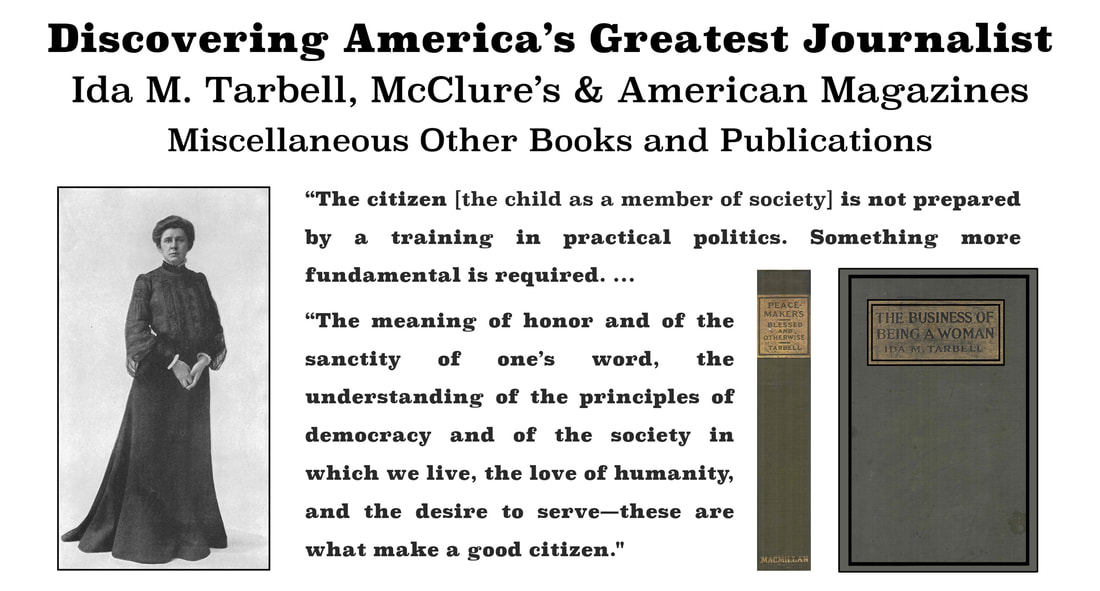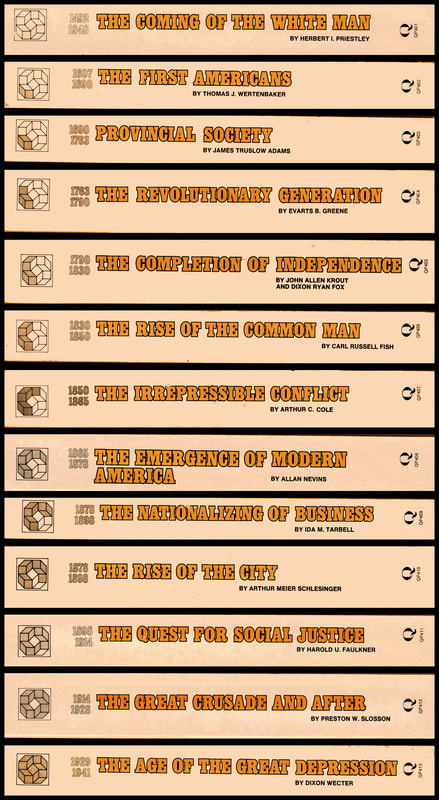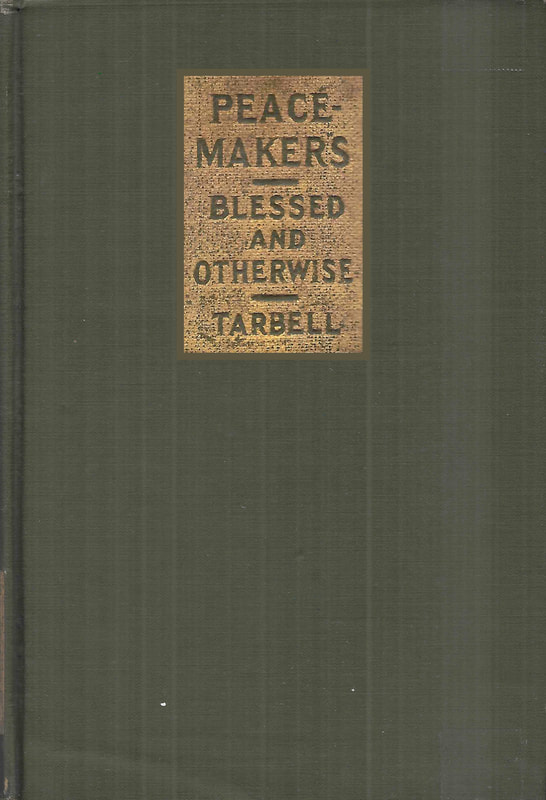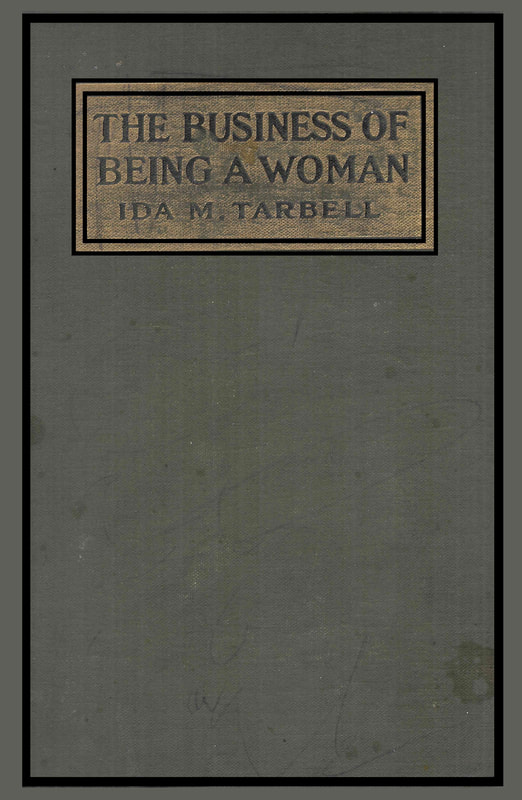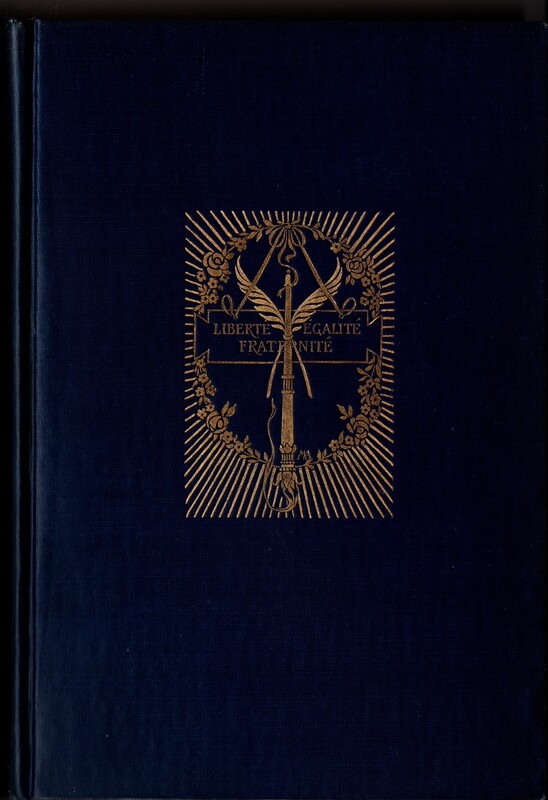Ida M. Tarbell's Miscellaneous Books and Publications
- 1936: A History of American Life: The Nationalizing of Business 1878-1898
- 1922: "Peacemakers: Blessed and Otherwise"
- 1912: "The Business of Being a Woman" and "The Ways of Woman"
- 1898: "Recollections of the Civil War" by Charles A. Dana
- 1896: "Madame Roland: A Biographical Study"
- 1895: "A Short Life of Napoleon Bonaparte"
A History of American Life: The Nationalizing of Business 1878-1898
|
A Review of A History of American Life: Volume IX
Reviews of the Day: 1936 “Miss Tarbell’s ‘The Nationalizing of Business’ forms Volume IX of the series, ‘A History of American Life.’ … It is complete in its own right and written with a tinge of that pedantry and legalistic style which so often characterizes volumes that belong to a historical “series.” …
Miss Tarbell’s history is written from a most moderate viewpoint. She never seeks to color the picture falsely in favor of the labor movement, or plant suspicion of the employers’ integrity in a situation where the facts were unavailable. … |
The reader should not, of course, stop at Miss Tarbell’s account, compressed as it is into less than three hundred pages. … No more than a summary of the facts.”
“Capitalism in American,” by William Gilmore
The Brooklyn Daily Eagle, November 29, 1936
The Brooklyn Daily Eagle, November 29, 1936
Selected Observations of Ida M. Tarbell's from A History of American Life
I was once again impressed by Ida M. Tarbell’s’ balanced approach to history and her description of the actors who interacted—and sometimes fought—with each other. She covers the individuals with Emerson’s Lengthening Shadow who led capital, business and labor during this time.
In order to impress this balance on the reader, I captured some of her comments from the book.
In order to impress this balance on the reader, I captured some of her comments from the book.
Writing on the impact of business consolidation
“The chief complaint against this [economic] system was that its leaders had taken too big a share of the profits for themselves. The country was prone to forget the benefits it had derived. It complained of the cost of telegraphing but failed to remember that in twenty years the number of offices had increased from eight thousand to more than twenty-two, thus giving hundreds of thousands more men and women the advantage of quick communication.
“Moreover, the service was cheaper, the average charge per message having fallen from 38.9 cents in 1878 to 30.1 in 1898.”
“Moreover, the service was cheaper, the average charge per message having fallen from 38.9 cents in 1878 to 30.1 in 1898.”
|
Overall perspective on the 1878–98 period of the nationalization of business
“Great strides had been made in state legislation protecting and improving the condition of labor. It touched a wide range of subjects: sweatshops, laundries, mines, railways, occupational devices, the guarding of machinery, housing, free unemployment bureaus, child labor, and woman’s labor.
"Some of these laws were defective in form; others were poorly enforced or were stripped of their value by action of the courts. Nevertheless, they brought the wage-earning class under the protective care of the government to a degree unknown twenty years before and prepared the way for more effective legislation by the next generation.” This last thought reminds me how we should always be pushing forward, but it is the wise person who stops to realize what they currently have, acknowledge the upward spiral, and understand the value of moving forward wisely, avoiding the revolutionary, militaristic or anarchistic voices that are allowed to speak and be heard in a democracy.
|
This Author’s Thoughts on A History of American Life: Volume IX
After reading a few chapters, the method I employed in reading this book was to first flip to the end of each chapter and read the last few paragraphs—Miss Tarbell’s summarization of each. Following this methodology, the chapters I found most interesting were the following: The Farmers Organize, Efforts for Industrial Peace, The Coming of the Panic of 1893, After Twenty Years, and Critical Essay on Authorities (actually referred to today as Acknowledgements). The Consolidation of Labor also deserves a mention.
The Nationalizing of Business 1878–1898: Volume IX is on par with Mark Sullivan’s Our Times. Mr. Sullivan’s series of six volumes focuses on the opening twenty-five years of the 20th Century, where this series takes a more expansive look at American life from 1492 through, initially, 1928—Volume XII, which was then extended through 1941 and The Great Depression with Volume XIII.
The Nationalizing of Business 1878–1898: Volume IX is on par with Mark Sullivan’s Our Times. Mr. Sullivan’s series of six volumes focuses on the opening twenty-five years of the 20th Century, where this series takes a more expansive look at American life from 1492 through, initially, 1928—Volume XII, which was then extended through 1941 and The Great Depression with Volume XIII.
|
I have ordered this complete set of thirteen volumes. It will take a long time to read—if ever to be completed, but, in the meantime, I will scan the work into my collection, make it searchable and available for my on-going business research.
Of great interest was a book referenced in this volume which led me to a new, fascinating work on Andrew Carnegie: The Life of Andrew Carnegie by Burton J. Hendrick. I purchased it for a deeper look into the Homestead Strike, and I was not disappointed. [review is available here]. I am beginning to understand the weaknesses in a “community-supported” Wikipedia information system—we are paying a precious price for free, biased, incomplete information, and we are experiencing the limitations that our current system of copyright law enforces on researchers that makes critical information published after 1928 so hard to obtain. If knowledge is power and if an educated people are the best hope for a democracy, we need to address these shortcomings in making complete, detailed and critically reviewed information available.
|
Thirteen-volume set
|
Then, we as citizens need to take advantage of it and educate ourselves.
Cheers,
- Pete
Cheers,
- Pete
"Peacemakers: Blessed and Otherwise"
This book should be required reading for the current U. S. Secretary of State and their corps of diplomats.
|
As with most of her writings, Ida Tarbell injects timely insights and timeless wisdom into the "Conference on the Limitations of Armaments" held in Washington D. C. in 1922. This book is a compilation of her "observations, reflections and irritations" at the conference as written and published each week for McClure's Magazine.
Here are a few of her thoughts, observations, and … irritations: Of the surrounding press corps she observed:
|
- Writers covered up their ignorance of things by doing prophecies, by shrieks of despair, by poses of intimacy with the great, by elaborately spun-out theories.
Of our history of isolationism she writes:
- It may be that the United States does not yet sufficiently understand that the principle of unionism which is its strength is a world principle, that one primary cause of wars in this world is isolation, with its necessity of being suspicious, on guard, ready to strike - like a rattlesnake.
- We {the United States] were coming to our senses, realizing that we are of the world, and if we are to enjoy its fruits, we must bear our share of its burdens; that if we would have peace, the surest way is to use our strength and our good will to guarantee it.
- What it all amounted to was that the most drastic limitation [on armaments] was no sure guarantee against future war. Take away a man's gun and it is no guarantee that he will not strike if aroused. You must get at the man - enlarge his respect for order, his contempt for violence, change his notion of procedure in disputes, establish his control. It takes more than "gun toting'' to make a dangerous citizen, more than relieving him of his gun to make a safe one.
- The only system a man can successfully handle is that in which he has faith; the only fair way to judge what he does is by what he undertakes to do - not what you would like him to undertake.
This is another amazing Ida M. Tarbell book. She offers wonderful insights into human interactions at a major worldwide conference that was intended to better mankind's lot in life.
Many of these issues we are still struggling with today.
Many of these issues we are still struggling with today.
"The Business of Being a Woman"
|
This book was an amazing read. As a former single parent with three children, I found that it validated the time and energy I put into my family. I wish I would have read it then or even later as a step-father, as I know it would have given me a stronger sense of worth and an understanding of my end-goal in raising a family.
The following are extracts from the book.
|
Such statements to me can not be contained within a single century. They are timeless. I know that some women have commented that they found this book archaic and in some way degrading to women. I found it just the opposite.
To me it validated my worth as a single father who invested everything into building a home with a soul and purpose - as best as a single parent can. |
"The Ways of Woman" was published after "The Business of Being a Woman."
|
"Recollections of the Civil War"
|
This is included in Ida Tarbell's list of books because she was Charles Dana's ghostwriter. Since I am not a Civil War enthusiast, this book contained mildly interesting information until I read that one chapter with my name on it: "Abraham Lincoln and his Cabinet."
This was the chapter that made the book worthwhile for me. This chapter was like reading a condensed version of Team of Rivals: The Political Genius of Abraham Lincoln by Doris Kearns Goodwin. Dana writes, "When Mr. Lincoln was inaugurated as President, his first act was to name his Cabinet; and it was a common remark at the time that he had put into it every man who had competed with him for the [presidential] nomination." |
He then goes on to describe Seward, Stanton, Chase, Welles, Blair and Bates. It was an amazing collection of men and egos that probably only a personality like Lincoln could have turned to an excellent purpose.
The good news is that the second time I "read this book" I will only be reading one chapter.
The good news is that the second time I "read this book" I will only be reading one chapter.
